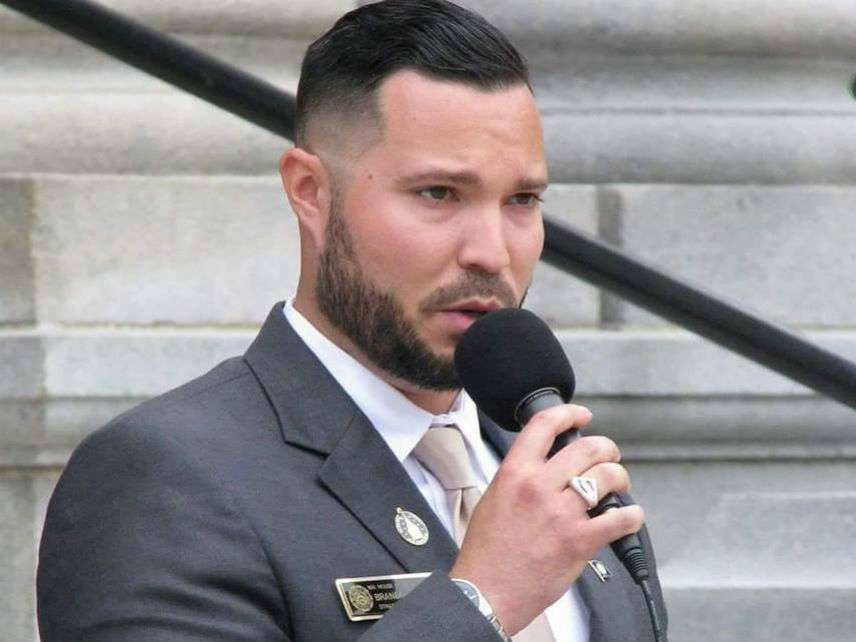How Elected Libertarians Are Making the World More Free
From occupational licensing reform to legalizing beer-drinking on stage, elected Libertarians are doing some pretty interesting things
What exactly do Libertarians do?
Wait — don't answer that. As someone who edited a small-l libertarian magazine for eight years, I know all your jokes: Libertarians are the people who lose (or spoil!) elections. They perform aesthetically challenging stripteases on CSPAN, conduct unfortunate personal experiments with colloidal silver. I GET IT.
But at least 169 of these exotic creatures also hold elected office across the country, from a broke, 19-year-old college student who sits on the Board of Assessment Appeals in tiny Cromwell, Conn., to the land commissioner for the state of New Mexico. And what these critics of government power are doing once they acquire it may provide a flicker of whimsical hope in these dark and fractious times.
Brandon Phinney, a 30-year-old Army vet who found libertarianism through Ron Paul, was elected to the 400-member New Hampshire House of Representatives in 2016 as a Republican. He then switched parties after discovering to his horror that elected GOP officials did not mean what they said about cutting the state budget.
"I didn't appreciate, and I'm sure my constituents wouldn't appreciate, that I would vote in favor of a bill that was contrary to what I ran on," Phinney told me last week at the biennial Libertarian Party National Convention, in New Orleans. Ah, youth!
Phinney in New Hampshire does something I wish we'd see more of in California: He pores through the ever-expanding state code, looking for laws that are anachronistic, impossible to enforce, and/or just plain wrong. The he tries to remove them.
For instance, the Live Free or Die State had on its books for more than a century a prohibition against reusing glass milk-delivery bottles for any other substance besides milk. This bit of dairy industry protectionism wasn't exactly high on inspectors' things-to-fine list, but as Phinney explains, "Anything in a statute that has a financial penalty or a chance to get charged for a crime, it's something that I care about."
One of the country's few elected atheists, Phinney has played in a bunch of bands (including one called Godcrusher, because Libertarian), and that experience led to another discovery of legislative arcana: New Hampshire is one of the few states in the union where performers are barred from drinking alcohol on stage. Or I should say were, until Phinney tackled the problem.
"It may not be a big, sexy policy change," he said. "But to me, it actually helps the entertainment industry tremendously from not having that enforcement over their heads, not having to worry about the state coming in and screwing with their property."
Phinney faces his first reelection with an "L" next to his name this November, which will be an important early indication of whether the L.P. is able to protect, and thus lure more of, its recent converts from the two older parties.
Another key party switcher facing electoral challenge this year is Nebraska state Sen. Laura Ebke. Ebke, who transferred from the GOP to the L.P. two years ago over issues of civil liberties, achieved something this spring that libertarians have been talking about forever: occupational licensing reform.
Going forward, it won't be so easy for the Cornhusker State to strip business licenses from ex-convicts, impose onerous training requirements instead of periodic inspections, or add new professions to the 172 occupations that currently require the state government's blessing. Like Phinney's bills, Ebke's passed with overwhelming bipartisan — nay, tripartisan — support.
"Most of the co-sponsors are Republicans," she told Reason in April, but "the fact that I'm not a Republican allows some of the more liberal members of the body to come and talk to me."
Having Libertarians play the honest, respected brokers between Dems and Repubs may seem far-fetched, depending on your operating caricature of libertarians' interpersonal skills. But that's just what Mayor Jeff Hewitt has done in Calimesa.
The swing vote on a split city council, Hewitt, a garrulous former swimming pool digger, convinced his small town to tackle one of California's biggest problems: The unsustainability of public sector pensions. Instead of contracting fire services from unwieldy Riverside County, with its top-down engine-staffing rules and defined-benefit pensions, Calimesa under Hewitt's tutelage opted out and created its own tiny fire department, saving taxpayers a bundle.
Now Hewitt is running for a spot on the Riverside County Board of Supervisors. He's running neck and neck with Russ Bogh heading into November.
The Libertarian Party needs, and is finally getting, some demonstration projects about how to govern better. Getting more Jeff Hewitts in more important positions could transform the little party that couldn't into not just the country's leading third party (which it is already), but also a bloc that can at long last change the behavior of the top two.
"The Libertarian Party doesn't need any more principle, doesn't need any more platform — it's got great ideas," Hewitt said. "Now, how do you implement them? We obviously elect officials."
This article originally appeared in the Los Angeles Times.



Show Comments (73)